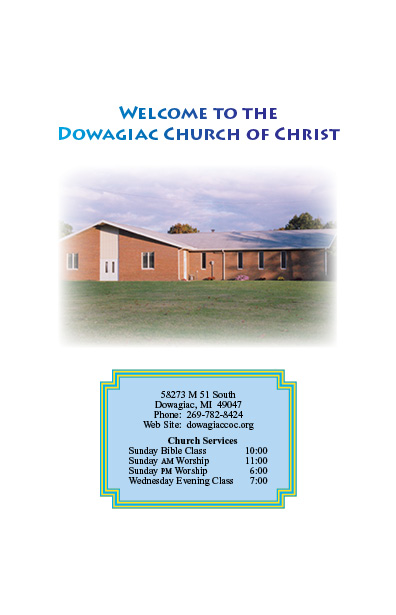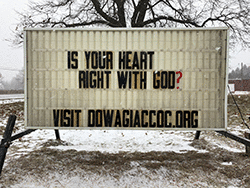Home Worship Services Sermons Location Contacts Bulletins Links |
FAMILY NEWSLADIES CLASS — Between weather problems and personal schedules the ladies have had a hard time meeting together for their Saturday study and fellowship. The February class is now scheduled for the 4th Saturday — the 23rd at 10:00 A.M. Put that date on your schedule and you will be contacted if weather does not allow the class to take place. WEATHER PROCEDURE. If the weather is bad for any service we have we will use a phone tree to advise everyone of whether services are canceled or not. The Gibsons are the closest ones to the building and will make the final decision based on road conditions in Dowagiac. If services are canceled we have a phone tree set up where anyone who attends regularly will be called. If you have doubts, call the Gibsons at 782-4564 or the Claytons at 687-9426. THANKS: You will notice that the property has been prepared for the construction project now scheduled for March. We want to thank Shane Wallace for using his equipment to do what would have been an almost impossible job without him. The bush is in the thicket on the corner of the property if anyone wants a cutting of it. Thanks to everyone working on the inside of the building as well. TODAY'S LESSON
INTRODUCTION — SONG: “When We Meet in Sweet Communion”
A. This is a very important part of worship.
PURPOSE 1 — REMEMBRANCE
1. Acts 20:7 — Main purpose in getting together
B. What is Memorial Day about? How has it changed, not by qualification, but by practice?2. 1 Corinthians 11:18-22 — Communion can be abused, not by qualification, but by practice? C. There are three purposes in any memorial. A. 1 Corinthians 11:24 — How do we remember Jesus?
PURPOSE 2 — PROCLAMATION
1. What does a picture do?
B. No picture of Jesus has any meaning.
2. How do you remember a loved one? 1. Pictures do not show love, pain, sacrifice.
C. How do we feel the pain of someone's absence?2. Have you ever been disturbed by Jesus' death? What do we do during Memorial Day?
PURPOSE 3 — SELF-EXAMINATION
1. Why parades, why speeches, why flags?
B. 1 Corinthians 11:26 — “PROCLAIM”
2. Why do we have funerals? 1. Our identity as Christians — united.
2. Lateral and vertical communications. 3. “Jesus is coming again.” A. A personal time of looking at yourself.
WE NEED TO BE REMINDED TO REMEMBER! B. The world affixes blame, not self-examination. When do you look at yourself? C. 1 Corinthians 11:28 — A weekly exercise 1. Many are weak and sick. Are you?
D. James 5:13 — Do you have a need not addressed? What is your relationship to the body of Christ?2. Have I died spiritually? 3. Am I growing? Am I learning? E. Communion is a tool to facilitate all of this. THE BACK PAGEMISUNDERSTANDING COMMUNIONWe hear a lot of words in connection with the Lord's Supper, Communion, or Eucharist that are poorly understood by most of us. The word communion comes from the Latin communion, derived from the Greek κοηνωνία (koinonia). It refers to the sharing of fellowship between those partaking in the sacrament with one another and with Jesus. The word Eucharist comes from the Greek word εὐχαριστία (eucharistia), which means “thanksgiving.” All of these words refer to the same thing with the words chosen providing the emphasis the speaker wishes to put on it. When a group uses the word “communion” the emphasis is on sharing and having fellowship with one another and with Jesus. The Roman Catholic church also teaches transubstantiation — that the whole substance of the bread and the wine changes into the substance of the body and blood of Christ when consecrated in the Eucharist. This has led atheists to accuse the Catholic church of cannibalism. As you study 1 Corinthians 11:23-29; Luke 22:14-20; Matthew 26:26-29; and Mark 14:22-25 you see that most human modifications of the Communion have contradicted Jesus. There is no mention of transubstantiation and, in fact he was still alive when he talked about his body and blood, so that tradition is in contradiction to the Bible. The makeup of the elements of the communion is important. Leaven was anything fermented. It would take time for leavening to act, and when the Israelites left Egypt, they did not have time. Fermentation was considered to be a form of corruption, so unfermented or unleavened bread indicated the perfect love of God in his perfect Son. The fruit of the vine was a symbol of blood, and throughout history blood has been symbolized by the fruit of the vine. In communion the fruit of the vine reminds us of the blood Jesus shed which washed away sin. Perverting that to an alcoholic drink was a huge insult to Jesus, and so Paul's strong words in 1 Corinthians 11:27-34 are better understood when we understand what the symbols were all about. — John Clayton Our sign by the street!
The sentence on the sign is from the song of the same name by Elisha A. Hoffman. Scripture links/references are from BibleGateway.com. Unhighlighted scriptures can be looked up at their website. www.dowagiaccoc.org |

